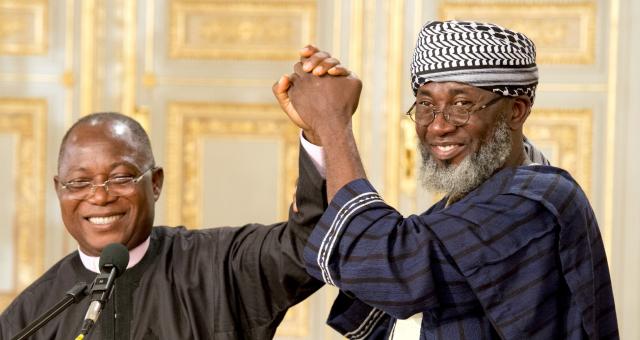
Tanenbaum Peacemakers in Action Pastor James Wuye and Imam Muhammad Ashafa
Today marks the sixth annual Global Ethics Day, launched in 2014 by the Carnegie Council for Ethics in International Affairs. Last year, we spoke about what ethics mean in today’s world and how the work of Tanenbaum’s Peacemakers in Action actively defines that role. This time around, we decided to take a look at the aftermath of violence driven by hatred and how ethical reconciliation plays a part in the entire process, from initial reactions to post-traumatic healing.
On March 15, a gunman entered the Al Noor and Linwood mosques in Christchurch, New Zealand, and opened fire, killing 51 people and injuring dozens more. By now, this is an all-too-familiar tragedy, but what sets it apart is the united answer of the New Zealand people and government. The immediate actions taken are well known, and ongoing efforts include creating a registry of all guns and enacting a gun buyback program for anyone in possession of any gun or modifications that are now banned.
What remained to be addressed, however, was the risk of a divided community giving way to mounting suspicions and resentment. This prompted Initiatives of Change NZ, a global organization dedicated to “building trust across the world’s divides”, to invite our Peacemakers in Action duo from Nigeria, Pastor James Wuye and Imam Muhammad Ashafa, to New Zealand this past August.
The Imam and the Pastor were brought to help build trust and forgiveness among the people, and began their trip in Dunedin, meeting and engaging with professors and students at the University of Otago. At the Linwood mosque in Christchurch, site of 9 of the 51 victims, Imam Ashafa led a powerful prayer on forgiveness.
The Peacemakers next met with the interreligious council and engaged with its Christian members on how to engage with Muslims and increase Christian fellowship with their Muslim sisters and brothers, specifically those who were impacted by the tragic shootings. Lianne Dalziel, Mayor of Christchurch, met with Pastor James and Imam Ashafa and praised their interfaith training and capacity building.
The pair then visited Al-Noor Mosque, where 42 worshippers were shot and killed. No strangers to interfaith conflict and reconciliation, Pastor James and Imam Ashafa engaged the mosque constituents on reaching across to their fellow Christians and building trust. Their last stop in Christchurch consisted of meeting with representatives of the Christchurch police force. The two imams of the Linwood and Al Noor mosque accompanied them to help deepen conversations between Muslim community leaders and the police.
Traveling on to Wellington, they made their first stop at the Wellington Kilbirnie mosque and opened a dialogue with the imam and Muslim community on how to connect with other religious traditions. This proved necessary, as local Muslims had expressed fear after people started highlighting the dangers of Muslims in the country following the killings.
Finally, the pair ended their New Zealand efforts in a Wellington church, where they participated in a public Q&A for a full house! With the combined efforts of New Zealand representatives, communities, and peace promotors like Pastor James and Imam Ashafa, the nation of 4.9 million people have elicited an ethical reaction to a deeply unethical action, providing an alternative model in the wake of tragedy: one of sustainable trust, understanding, and of comprehensive initiatives from the governmental level down to local communities.
You can read more about the Pastor and the Imam’s time in New Zealand, or listen to either of their radio interventions, both local and national.